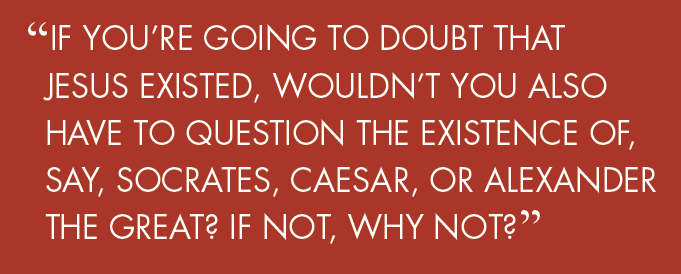Savior? Shaman? Myth? Ink Blot? Why Christianity's Main Man Remains so Elusive
DURING A DECIDEDLY staid Presbyterian wedding ceremony some years back, I passed the time reading the Gospel of Matthew from the Bible sitting before me in the pew. And I was struck by something I’d never noticed before—the stories of Jesus at the beginning and the end of Matthew seemed very, very different.
At the beginning of his ministry Jesus might be compared to a guru or a shaman—a wandering holy man who imparts bits of timeless wisdom, offers spiritual encouragement to the downtrodden, and performs random acts of (magical) kindness. Blessed are the poor, he says, and then he cures a leper, casts out some troublesome demons, or calms a stormy lake. Not very master-of-the-universe but appealing even so. But then, as the story progresses, dark edges emerge. His truth claims become more exclusive and self-promotional; his parables include threats. He becomes suspicious, talking about enemies and demanding loyalty from his followers. He predicts his own death and then brings it on.
At the time, I had recently read a story about how Jim Jones led 900 followers to mass suicide in Guyana in 1978. Some who had broken away (and so survived) discussed Jones’s early generosity and wisdom followed by years in which he became ever more righteous, controlling, and certain of his direct line to God. Wow, I thought. Was Jesus a paranoid schizophrenic? Only later would I learn that some antiquities scholars had another hypothesis for the dramatic difference between early and late Jesus. The stories came from two distinct bodies of literature; the book of Matthew simply merged two different characters. Later still, a retired Presbyterian minister and religion professor, Tony Nugent, introduced me to some of the ancient stories he believes underlie the Gospel accounts, stories that trace their roots beyond the Hebrew religion and into more primeval traditions centered on the sun, stars, and agricultural cycle.
What does all of this mean about Jesus? With relentless advances in fields like archeology, linguistics, forensics, and pattern analysis, most scholars, including mainstream Christian theologians, have come to agree that the Jesus stories in the Bible are woven through with legend. Over the last 200 years more than a few have devoted their life’s work to trying to excavate the “historical Jesus” behind the myths.
Was there a man behind the myths? Most scholars say yes. Bart Ehrman has done as much as anyone to make modern biblical scholarship accessible and interesting to ordinary people. In his 2012 book, Did Jesus Exist?, he comes down firmly with the majority:
As I have repeatedly noted, most scholars in both the United States and Europe over the past century have been convinced that Jesus is best understood as a Jewish apocalyptic preacher who anticipated that God was soon to intervene in history to overthrow the powers of evil now controlling this world in order to bring in a new order. . . . establishing a rule of peace and justice here on earth, sometime, Jesus thought, within his own generation.
Some who disagree with the consensus position argue that Jesus was a rabbi concerned with re-invigorating Jewish law, or a social reformer, or a political Zealot urging armed uprising against Rome, or an ascetic philosopher akin to the Cynics of Greece. Some, of course, continue to believe that the Bible stories are literal histories and that Jesus was God made flesh, sent to earth to be the perfect and final blood sacrifice. What’s surprising to many people is that a minority of scholars think he never existed at all, that the original kernel of the Gospel stories was a set of literary or mythic tropes, folklore, and traditional sayings which later got “historicized.”
 This past summer, after interviewing author and historian David Fitzgerald (Nailed: Ten Christian Myths that Show Jesus Never Existed at All), I wrote a piece for Alternet that was picked up by Salon and Raw Story outlining the kinds of evidence and non-evidence that keep this debate alive. My inbox erupted. I haven’t had so many readers question my integrity or intelligence—or both—in years. Some critics claimed I had called Jesus a myth. (I hadn’t. In general I think it wise to defer to the opinion held by a majority of relevant experts, while bearing in mind that paradigm shifts do happen.) Several said I had taken a quote from Ehrman out of context and used it as evidence for something he doesn’t believe. (I had, and my sincere apology to Ehrman stands.) Some compared both Fitzgerald’s position (called mythicism) and my article to creationism or climate change denial. Ouch.
This past summer, after interviewing author and historian David Fitzgerald (Nailed: Ten Christian Myths that Show Jesus Never Existed at All), I wrote a piece for Alternet that was picked up by Salon and Raw Story outlining the kinds of evidence and non-evidence that keep this debate alive. My inbox erupted. I haven’t had so many readers question my integrity or intelligence—or both—in years. Some critics claimed I had called Jesus a myth. (I hadn’t. In general I think it wise to defer to the opinion held by a majority of relevant experts, while bearing in mind that paradigm shifts do happen.) Several said I had taken a quote from Ehrman out of context and used it as evidence for something he doesn’t believe. (I had, and my sincere apology to Ehrman stands.) Some compared both Fitzgerald’s position (called mythicism) and my article to creationism or climate change denial. Ouch.
I was advised, in no uncertain terms, that academic mythicists, otherwise known as real scholars who doubt that the Gospel stories have historical roots, are about as hard to locate as Jesus himself. So when one of them reached out to me from Australia and offered a conversation, I said yes. I sent him some questions I was dying to ask—and then for good measure sent them to two other Jesus scholars who had made contact as well.
 Raphael Lataster teaches in the department of Religious Studies and Philosophy at the University of Sydney. He wrote a master’s thesis on Jesus ahistoricity theories, continues to publish on the topic in peer-reviewed journals, and is currently engaged in doctoral studies analyzing major arguments for the existence of a deity. Lataster says he is respectful towards and fascinated by religion, especially traditions that focus more on right living than right belief. When it comes to his own hypotheses about reality—well, the title of his book minces no words: There was No Jesus, There is No God (2013).
Raphael Lataster teaches in the department of Religious Studies and Philosophy at the University of Sydney. He wrote a master’s thesis on Jesus ahistoricity theories, continues to publish on the topic in peer-reviewed journals, and is currently engaged in doctoral studies analyzing major arguments for the existence of a deity. Lataster says he is respectful towards and fascinated by religion, especially traditions that focus more on right living than right belief. When it comes to his own hypotheses about reality—well, the title of his book minces no words: There was No Jesus, There is No God (2013).
 Neil Godfrey runs the website Vridar, a repository of articles and debates about Jesus including a “who’s who” of mythicists and Jesus agnostics, meaning those who argue that our sources are too poor to answer the question. Godfrey is most interested in understanding the Gospels and Epistles as products of the literary and philosophical contexts of their authors. He finds those explanations entirely adequate without seeing any need to add a historical Jesus to the mix.
Neil Godfrey runs the website Vridar, a repository of articles and debates about Jesus including a “who’s who” of mythicists and Jesus agnostics, meaning those who argue that our sources are too poor to answer the question. Godfrey is most interested in understanding the Gospels and Epistles as products of the literary and philosophical contexts of their authors. He finds those explanations entirely adequate without seeing any need to add a historical Jesus to the mix.
 James McGrath teaches New Testament studies at Butler University in Indianapolis. McGrath is equally scornful of mythicists and biblical literalists. He blogs about religion, the Bible, science fiction, evolution, and more at Exploring Our Matrix, where his scorching critique of my first article on this topic caught my eye. His books include John’s Apologetic Christology (2004), The Only True God (2009), and (for a more popular audience) The Burial of Jesus (2008).
James McGrath teaches New Testament studies at Butler University in Indianapolis. McGrath is equally scornful of mythicists and biblical literalists. He blogs about religion, the Bible, science fiction, evolution, and more at Exploring Our Matrix, where his scorching critique of my first article on this topic caught my eye. His books include John’s Apologetic Christology (2004), The Only True God (2009), and (for a more popular audience) The Burial of Jesus (2008).
Valerie Tarico: From everything I hear you are the proverbial unicorn—the academic who contends there was no historical Jesus.
Raphael Lataster: Indeed. Of course, every position, scientific breakthrough, and religion was originally held or believed by an extremely small minority. The truth is not a democracy. It doesn’t care about what we think, or feel. It is what it is.
As for the notion that few serious scholars question the historical existence of Jesus, Robert Price (The Christ Myth Theory and Its Problems) is a credentialed biblical scholar and inspired me to begin this journey. Likewise, Richard Carrier (On the Historicity of Jesus: Why We Might Have Reason for Doubt) is a capable historian. I’m hoping my own “coming out” as a historical Jesus agnostic may add something to the discussion. The University of Sydney is rated in the top fifty universities internationally, and I have been influential in swaying several lecturers in my department to the side of Jesus agnosticism. I find that religious studies scholars in general are receptive to questioning Jesus’s historicity due to their understanding of what religion is, that it does not always rely on “what really happened.”
Tarico: Historian R. Joseph Hoffman has said that historical argumentation is “probabilistic (in the sense of following the ‘law of likelihood’).” What does that mean?
Neil Godfrey: Much of the ancient history I learned in high school—about the Hittites, the spread of Indo-European languages, the Amorite invasions—is now known to be wrong. To be open to new evidence and insights, historians had to treat their current knowledge as tentative or “probable.” What we have is still very incomplete, so we can only make judgments about what seem from today’s perspective to be the most probable scenarios.
The best approaches to history oblige us to think carefully about all sides of the question and the nature of our evidence. What is our hypothesis? What evidence do we have for our hypothesis? What is the likelihood (or probability) that we would have this evidence if our hypothesis were false? How about the likelihood that we would have this evidence if our hypothesis were true?
Some Jesus scholars use a mathematical model, Bayes’ theorem, to lay out these probabilities. It stops the historian from carelessly saying, “Augustus sent out a decree so that a census should be taken of the entire world,” and compels him or her to say instead, “We have one document, a Gospel of unknown authorship from the late first or early second century, that says Augustus sent out a worldwide decree for a census.” That might sound like a pretty obvious way to work, but when it comes to New Testament scholarship it is surprising how many scholars talk about “the fact” of, say, the empty tomb instead of the real fact, which is the Gospel narratives of the empty tomb.
Tarico: It seems like a key difference between scholars who feel confident that Jesus was a real person and those who are more doubtful is that they approach the question from different angles or place more or less value on different kinds of information.
Lataster: I have just published an article on this and am working on a bigger project, arguing just that. One of the oddities about mainstream historical Jesus scholarship is the heavy reliance on sources that do not exist.
Godfrey: Definitely. Mythicists like Thomas Brodie and Robert M. Price focus on the wider Jewish and Greco-Roman literary world and believe many of the New Testament stories are adaptations of stories found in other literature. Their arguments often address the New Testament Epistles, because it is generally accepted that most of the Epistles were written before the Gospels. They see a lot in common between Paul’s Christ and the writings of Jewish and Hellenistic literature known in his day, including notions of a heavenly mediator figure or Logos as well as evolutionary development of messianic concepts in various Jewish writings.
Historicists, on the other hand, generally work within a model of Christianity that paraphrases the Gospels and Acts: Christianity started in Palestine with a few lowly followers of Jesus who became convinced that their leader was somehow still with them and victorious over death, and who then persuaded first many Jews and then growing numbers of Gentiles to join them. They believe the narratives derive from oral tradition tracing back to Jesus, and that Christianity could only have started with a historical Jesus. No other explanation makes sense to them.
James McGrath: I would say that doubt about the historicity of Jesus is not what makes one a mythicist. In the case of ancient history, the appropriate standard is (in my opinion) “more probable than not” rather than “beyond a reasonable doubt.” But be that as it may, it’s not doubt about the historicity of Jesus but insistence that Jesus is unlikely to have been historical—and that his first devotees thought he was a celestial deity rather than a terrestrial human—that deserves to be called “mythicism.” It’s important to distinguish that view from the uncertainty mainstream scholars may feel about whether we can discern anything more than a few basic facts through the veil of legend, myth, and dogma that shrouds the origins of Christianity from our view.
Tarico: This probably deserves a book-length essay, but in a paragraph or two, how would you describe the backbone of your own approach? What are the key questions?
Lataster: I am a big fan of probabilistic reasoning, particularly Bayesian inference. Various hypotheses should be judged according to how well they explain the evidence we have, and their inherent plausibility. By its very nature, history is uncertain. We can only try to figure out what probably happened, and we should only speak of probabilities between (and not including) 0 and 100 percent.
One key question is, how reliable are the sources? Mainstream historicists place much weight on “hypothetical sources” that we don’t have access to and that may not have existed at all. This is their solution to the highly questionable sources we do have access to. How do you establish the author, date, intent, reliability, content, and so on, of non-extant sources when we even struggle to do this with the extant sources? They discount sources like the Gospels when evaluating the Christ of Faith, yet lean heavily on those same sources when we shift the discussion to the historical Jesus.
Another important question concerns the differences between Pauline Christianity and that of the Gospels. Paul is our earliest Christian author and has no encounters with an earthly, historical Jesus, never references him, and claims to get his information from God. Much of what is found in his Epistle (and others) coheres very well with Earl Doherty’s minimal mythicist view that the belief in Jesus initially was the belief in a purely celestial (and not earthly) being.
Godfrey: The backbone to my approach is to set aside the question of Jesus’s historicity altogether and ask what best accounts for the nature and origin of the Gospels and Acts. I study these the way classicists study any other ancient literature. What do both the internal and external evidence tell us about their origins and why they were written in the way they were? What is their relationship with other literature of the era?
Another very important question is how to assign dates. New Testament scholars generally try to date the Gospels as early as possible, but if we employ the methods normally used by ancient historians and classicists—a combination of external testimony and internal evidence—we must accept possibilities ranging from 70 to 140 CE. So, we must then ask, what external events provide the most likely background to the author, given the sorts of details we find in the narratives? Do they appear to have been written in a time of persecution? If so, what historical periods can we identify for that?
McGrath: I actually discuss some of the key elements of historical study in my book, The Burial of Jesus, which is aimed at helping religious believers understand and wrestle with the consequences of historical study. The backbone of my approach is mainstream historical study as it has been developed and practiced over the past half-century or more. Some mythicists suggest that scholarly opposition to mythicism is motivated by faith or unexamined Christian assumptions, but the work of mainstream historical scholars has been more profoundly unsettling to what I once believed about Jesus than anything mythicists have come up with.
To understand why so many scholars believe that our stories about Jesus have a historical kernel, one must understand the expectations within Judaism regarding an anointed one (or “messiah”) descended from David. There was significant diversity around the time Christianity emerged, but the expectation was that the Davidic dynasty would return to the throne. To claim that someone was that awaited dynasty-restorer, and yet that he had been crucified, was essentially an oxymoron. And yet that is what people like Paul were proclaiming. It is not impossible that someone simply invented this claim. Few things are impossible. But it is for good reason that historians find it more likely that we are dealing with an actual person named Joshua whose followers thought he was the awaited Davidic messiah, and who found a way to deal with the cognitive dissonance of his crucifixion.
Tarico: I come at this as a psychologist, not a classics scholar, and one lens that psychology brings to this debate is the knowledge that humans are highly prone to historicizing otherwise vague stories. Psychological processes in which this happens include confabulation (when alcohol-addled brains invent histories to fill gaps) and false memory syndrome, in which an expert asking leading questions unintentionally prompts a person to create memories that become more detailed and solid over time. In split brain research, a message can be sent to the right side of the brain, for example: Go get a diet coke. When the person stands up and the left side of the brain is asked why, it provides a perfectly coherent story. To my mind, in other words, psychological and social mechanisms exist that could make historicized mythology feasible. But the fact that something is “feasible” doesn’t mean it’s what happened. We also are highly prone to mythologizing history.
Godfrey: Many people cannot imagine Christian origins apart from the general outline of the Gospels and Acts. So we have apologists demanding, “How do you explain the empty tomb!” But all we really have is a story that Jesus was resurrected and the guards fled or fainted in fear. Within the story itself there is no explanation for the empty tomb apart from the resurrection. That’s what stories do. For example, Red Riding Hood’s grandmother really was devoured by a wolf because how else can we explain Red Riding Hood thinking the wolf was her grandmother?
One does not need a conspiracy to explain the invention of a literary character like Jesus. The first Gospel is highly symbolic. Jesus is a mouthpiece for cryptic and wise sayings and does things in the physical world that become metaphors for spiritual realities among readers. The stories of Jesus appear relatively late in the history of Christianity, and when they do appear they look remarkably like adaptations of older stories about Isaac, Joseph, Moses, David, Elijah, Jeremiah, and others.
The story of Jesus can also be explained as a natural evolution of theological ideas from Second Temple Judaism. Before Christianity, there were already Jewish groups that believed in a pre-existent heavenly messiah who was also a human (e.g., in the Book of Enoch); that the sins of their nation were atoned for by Abraham’s readiness to sacrifice Isaac; that the Books of Isaiah and of Daniel prophesied a divine “Son of Man” or “Servant” figure who would suffer and die on behalf of his people; and that a heavenly mediator or Logos figure existed in heaven similar to the one we read about in the Gospel of John and the New Testament Epistles.
So the raw material from which Christianity emerged was in existence well before the fateful year of the destruction of the Jewish nation in 70 CE. From that moment on it is quite plausible to imagine many Jews forging or salvaging a new identity from the old by believing in a successor to Moses—a new Joshua or Jesus whose temple was in heaven.
Tarico: If you’re going to doubt that Jesus existed, wouldn’t you also have to question the existence of, say, Socrates, Caesar, or Alexander the Great? If not, why not?
Lataster: I am happy to question Caesar’s existence. Some question the existence of Laozi and it doesn’t bother me one bit, despite being a fan of the Tao Te Ching’s teachings.
But while doubting the likes of Caesar does nothing to my worldview, it isn’t very reasonable. We lack primary sources for Jesus (and Laozi), but we have plenty for Caesar. Claims about the validity of Caesar’s existence also tend to be more analogous with how we understand the world to work. And while the rise of Christianity is readily explained even if Jesus didn’t exist, it is harder to establish much of Roman history without Caesar.
Godfrey: For some historical figures like Augustus Caesar we have the testimony of coins, inscriptions, and monuments that can reasonably be established from his time—what we can call primary evidence. We also have written records whose contents are at least in part independently supported by some of this primary evidence. These records are often written by persons whom we know—meaning we know their interests, educational level, familiarity with the material they write about, and access to contemporary sources—and they write in a genre that further testifies to an interest in conveying factual information. And on top of all this we have the explanatory power of Augustus Caesar to explain the change of course in Roman history.
So for all these reasons we can say the existence of Augustus Caesar is highly probable. As we move down the scale where evidence becomes ever-more scarce or even non-existent, or where we can see no clear link between later narratives about a person and sources contemporary with that person, then our confidence in the probability of their existence must decline.
McGrath: There’s no harm in making comparisons, but when it comes to influential figures—leaders of nations for instance—we should expect the evidence to be greater than for an individual who was not wealthy, minted no coins, and, as far as we know may not have been literate. Not all figures leave behind the same kinds of tangible evidence.
Tarico: After I wrote my brief, and admittedly casual, article about the Jesus question last summer and got such a strong reaction, I found myself thinking about that old saying, “Fools rush in where angels fear to tread.” Why are scholars on all sides of this issue so heated?
McGrath: I think the reason mainstream scholars react so vehemently to mythicism, even when they’re not concerned in any sense with defending the Christian faith, is because of what mythicism represents in terms of scholarship. The study of ancient textual evidence isn’t ever going to offer the same degree of certainty that can be obtained in the natural sciences. However, mythicism is a view that only a small number of academics argue for, and that most professionals in Christian, Jewish, and Roman history find unpersuasive. And yet it is being promoted to the public.
We might turn out to be wrong. But the way to demonstrate that is by making a scholarly case and persuading us. There are lots of fringe views in the academy and, indeed, part of being an academic is trying to come up with something new. Most of us will be wrong most of the time in those unconventional ideas and new proposals. That’s part and parcel of the scholarly endeavor.
And so, versions of mythicism popular online probably need to be distinguished from what scholars like Brodie and Price do. I find both of their work unpersuasive, as do most people in our fields. But they approach this topic in the appropriate scholarly manner, making a case and seeking to persuade their peers. That’s the way to go about settling a matter of scholarly inquiry, whatever the question happens to be.
Tarico: Today, almost half of American adults believe that the Bible is literally the perfect word of God. In fact, by way of circular evidence, many quote the Bible itself to prove this: “All Scripture is God-breathed and is useful for teaching, for reproof, for correction, and for training in righteousness” (2 Timothy 3:16). But claiming that a collection of Iron Age texts is the timeless word of God shackles people to a set of Iron Age priorities.
To me what’s important about this debate and what’s game changing for ordinary people and possibly our society as a whole is recognizing that the Jesus stories in the Bible are woven through with myth from earlier times and legends that probably developed in the first two centuries of Christian history. You all seem to agree on this—that the evidence suggests some parts are literature, mythology, and legend rather than history.
So on this central question—is Jesus a sacred literary tradition or a Yeshua ben Yoseph—does it matter, in the end, which of you is right?
Lataster: You have hit the nail on the head! The far more relevant issue is whether the claims about the Christ of Faith or biblical Jesus are true. I call the discussion over the historical Jesus a debate among atheists; it is an interesting historical question, no more. If we want to highlight the dangers of religious exclusivism (and I do), then let’s focus on God and the biblical Jesus.
McGrath: It matters which of us is right only to the extent that the evidence allows us to draw a conclusion with a reasonable degree of confidence. If the evidence points in a particular direction and we refuse to follow it, we are adopting a stance that I consider a dangerous one. There may be little serious consequence that results directly from this particular historical question. But once people are open to the kinds of selective skepticism used to reject mainstream history, the same approach can be applied to science, or medicine, or other domains in which the risks are much more immediate and severe.
Godfrey: There are many far more important causes and questions in the world. That said, Christianity and the Bible have had a major impact on my life and the lives of others so I find it natural to want to understand how it all began. I have had the benefit of a good education and the opportunity to learn much about scholarly research into Christianity and the Bible, and I like sharing what I find there with others.
Tarico: As I’ve gotten older, I think of Jesus more and more as an ink blot—an ambiguous shape onto which people project their own fears and desires. In response to my first article on this topic, a dear activist friend wrote, “I hope that you’re out there showing that if Jesus did exist, which is definitely up for grabs, that he was a radical revolutionary Jew who felt we should address the gap between rich and poor above all else.” She was joking, but also not. We all hope that our deepest values and acts of service are aligned with something universal. For Christians, a Jesus who shared those values is a powerful, enduring symbol that our lives have meaning.
My friend understands the Jesus she seeks to be a matter of hope, not history. The power of her Jesus comes not from whatever tentative facts scholars can glimpse in the fog of history, but from yearnings of the human spirit that are as relevant today as they were in the Ancient Near East. Perhaps the centuries of desperately seeking Jesus are best thought of as a quest to find and define ourselves. Perhaps that is enough.

